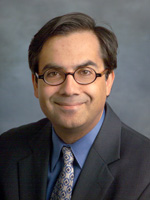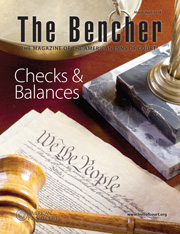Proposed Amendments to ABA Model Rules on Advertising
The Bencher—March/April 2018
By John P. Ratnaswamy, Esquire

 On December 27, 2017, the American Bar Association’s Standing Committee on Ethics and Professional Responsibility released, for review and comment, its Working Draft of proposed amendments to ABA Model Rules of Professional Conduct relating to “Information About Legal Services”, commonly known as the Model Rules on attorney advertising.
On December 27, 2017, the American Bar Association’s Standing Committee on Ethics and Professional Responsibility released, for review and comment, its Working Draft of proposed amendments to ABA Model Rules of Professional Conduct relating to “Information About Legal Services”, commonly known as the Model Rules on attorney advertising.
The standing committee’s proposal reflects several years of discussion prompted by the Association of Professional Responsibility Lawyers (APRL). From 2013 to 2016, APRL studied the subject and conducted outreach, including joint outreach with the ABA. In September 2016, APRL formally requested that the Standing Committee consider amendments to the advertising Model Rules.
The proposed amendments to the Model Rules affect Rules 1.0 (Terminology) (add definition of “Solicitation” and “solicit”), 7.1 (Communications Concerning a Lawyer’s Services) (amended and new Comments), 7.2 (Advertising) (changing the name of the Rule to Communications Concerning a Lawyer’s Services: Specific Rules, plus changes to body of Rule and amended and new Comments), 7.3 (Solicitation of Clients) (changes to body of Rule and amended and new Comments), 7.4 (Communication of Fields of Practice and Specialization) (changes to body of Rule and amended Comments), and 7.5 (Firm Names and Letterheads) (delete Rule) (some of the contents of Rule 7.5 are moved to the proposed new Comments to Rule 7.1).
The standing committee issued an explanatory and supporting 18-page memorandum as well as the working draft. The memorandum stated the proposal is prompted by the committee’s conclusions that the current advertising Model Rules are outdated, may be overly restrictive of commercial speech, and could hamper the ability of lawyers to adapt to technological changes that affect the practice of law and how consumers learn about available legal services. The committee also stated that the current Model Rules no longer serve as models because of variances in the versions used around the country. The committee explained that the proposed amendments seek to re-establish the Model Rules as models by encouraging more national uniformity; simplifying the rules that actually are enforced; maintaining the prohibition against false and misleading advertising; and accommodating developments in the profession, technology, and competition. “To protect consumers, the amendments free regulators from the onerous and complicated provisions now in pace, and focus attention on harmful conduct.”
In brief, the committee intends the proposed amendments to: streamline and simplify the rules while adhering to constitutional limits, protecting the public, and facilitating use of new technologies; combine the provisions on false and misleading communications into Rule 7.1 and its Comments; consolidate and update specific rules into Rule 7.2, while retaining that lawyer referral services are limited to qualified entities approved by an appropriate regulatory authority; and a new subdivision to Rule 7.2(c) on nominal “thank you” gifts as an exception to the general prohibition on paying for referrals; define solicitation while prohibiting live person to person solicitation subject to an exception for certain experienced users of legal services, eliminate the labeling requirement for target mailings but retain serval prohibitions relating to certain kinds of mailings; and retain most of Rule 7.4 regarding specialist designations.
Working Draft
Memorandum
The standing committee set a deadline of March 1, 2018, for comments on the proposed amendments. The committee intends to submit its proposal to the ABA House of Delegates for consideration at the August 2018 ABA Annual Meeting. I imagine that the committee may consider post-deadline comments given the interim length of time.
John P. Ratnaswamy, Esq. is a partner in the Chicago law firm of Rooney Rippie & Ratnaswamy LLP. He also serves as an Adjunct Professor of Legal Ethics at the Northwestern University School of Law. This column should not be understood to represent the views of any of those entities or John’s or the firm’s current or former clients.
© 2018 John P. Ratnaswamy, Esquire. This article was originally published in the March/April 2018 issue of The Bencher, a bi-monthly publication of the American Inns of Court. This article, in full or in part, may not be copied, reprinted, distributed, or stored electronically in any form without the written consent of the American Inns of Court.